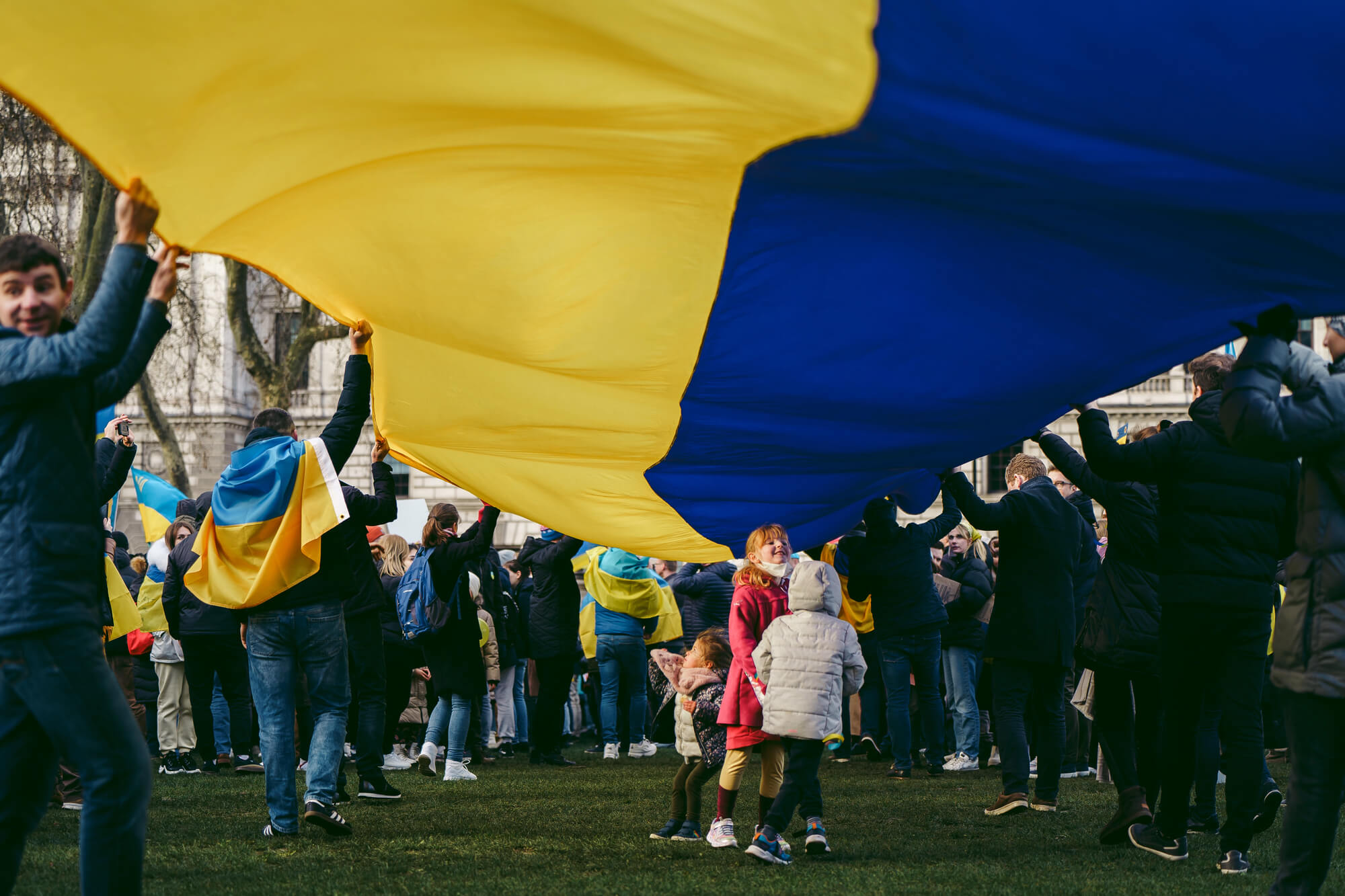Ukrainian media have given very contrasting assessments of what has happened in Berlin at the Normandy Four meeting. They ranged from “the betrayal of the national interest” to “Poroshenko has outwitted everyone”. VoxUkraine has asked Mykola Mursky, a research assistant at the Belfer Center for Science and International Affairs, where he investigates the peacebuilding process in the Donbas, to provide an objective perspective on the Berlin meeting.
On Wednesday, the leaders of Germany, France, Russia, and Ukraine met in Berlin for Normandy Format discussions of the conflict between Ukraine and Russia. German Chancellor Angela Merkel, French President Francois Hollande, Russian President Vladimir Putin, and Ukrainian President Petro Poroshenko, in a round-table meeting together with their foreign ministers and other advisors, agreed that it was necessary to develop a “roadmap” to implementing the Minsk agreements.
The two Minsk accords were signed in the Belarusian capital in September 2014 and February 2015. They comprise political, security, and humanitarian agreements. The accords are not designed to be international treaties, which would need to be ratified by parliaments, but rather deals that specify the details of a compromise between political and security tradeoffs. The largest difficulties with the Minsk agreements are that they do not provide an order in which the points should be implemented and that many of the provisions are ambiguously phrased. President Putin announced last year that security and peace can only come if Ukraine makes significant political concessions (including amnesty for separatist fighters and special status for the occupied territories). On the other hand, Ukraine will not agree to discuss any political concessions until a durable ceasefire is in place.
The Normandy Format leaders did not sign any documents or issue a joint statement. In a press conference, President Hollande said that the foreign ministers of the Normandy Format would begin working on plans for the organization of local elections “in eastern Ukraine” [sic] in the coming weeks and days. President Poroshenko, on the other hand, said that no elections may take place until Ukraine regains control of the occupied territories and foreign military formations pull out.
Interestingly, President Putin agreed to attend the meeting in Berlin only one day before it was scheduled to take place. This could be a sign of desperation, as some Western commentators have suggested, or a further ploy to garner international attention, or neither. Putin brought his personal aide Vladislav Surkov with him to Berlin, even though the latter is banned from travelling to the EU under the sanctions imposed after the annexation of Crimea. The reader will recall that Surkov is the man who introduced himself to an audience at the London School of Economics in 2013 by saying, “I am the author, or one of the authors, of the new Russian system.” Some pundits have interpreted this insubordination to the travel ban as a sign of Putin “sticking it” to the sanctions regime.
In Berlin, the Russian side continued to portray themselves as mediators between two factions of a domestic Ukrainian conflict. In a late-night statement, President Putin said, “We confirmed that we will continue our joint efforts on the political track, including those directed at reaching final endorsement on the procedure for implementing the agreement on the special status.” Putin also reiterated his concern for humanitarian issues, saying that the progress in this sphere “was probably minimal, because this is mainly linked to arranging social payments and benefits.”
It is significant that despite Russian leaders positioning themselves as mediators and not actors in the conflict, the German side recognized Russia as a party to the war. The deputy parliamentary chairman of Chancellor Merkel’s Christian Democratic Union, Franz Josef Jung said in a statement, “Most of the agreements reached thus far have not been implemented because the parties in the conflict — the Ukrainian separatists and Russia — have lacked the will to do so.”
In appearances after the meeting and over the weekend, President Poroshenko remained very optimistic about the outcome of the Normandy Format meeting. He and his representatives made many bold statements about the concessions that would be both made to and required of Ukraine. Let’s consider these issue-by-issue.
Poroshenko said in a press conference that the Berlin Roadmap would be a way to implement all the points of the Minsk agreements. It is worth noting that neither the separatists nor Ukraine wants all the points to be implemented. The separatists — here I am referring to the local residents of the Donetsk and Luhansk oblasts who joined militias and not to Russian soldiers or leaders — understand that the end result of full Minsk implementation is the return of the territory they control to Ukraine. This is one the reasons why the separatists continually attempt to violate the ceasefire, and why their Russian curators have had to impose such strict penalties on them for unauthorized firing on Ukrainian positions. On the other hand, Ukraine also does not want full Minsk implementation, for obvious reasons, not least of which is the fear of legitimizing the rebellion with special political status. The only party interested in full Minsk implementation is Russia, since political reintegration of the Donbas into Ukraine would give the Kremlin stronger (and cheaper) leverage on Kyiv than it has now.
The majority of the Normandy Format meeting was spent discussing security issues. The Special Monitoring Mission (SMM) of the OSCE continues to record ceasefire violations daily. The back-to-school ceasefire, which began on September 1, lasted only a week. Poroshenko said that all sides had agreed in the meeting that four new areas are to become “zones of disengagement” along the front line, from which Ukrainian and joint Russian-separatist forces will withdraw. The zones of disengagement should be monitored by the OSCE 24/7, he said. President Putin said in a statement that he agreed, confirming his “readiness to expand the OSCE mission in the disengagement zone and in locations where heavy equipment is stored.” Both sides agreed to not impede the work of the SMM, as required by Point 3 of Minsk 2, although the OSCE continues to record violations of their freedom of movement. The vast majority of cases in which the work of the SMM was blocked occurred on the occupied territories. However, it is important to note that the Ukrainian Armed Forces have also occasionally impeded the work of the SMM. Two days before the Normandy Format meeting, for example, the SMM reported dozens of violations by the joint Russian-separatist forces, and that “Ukrainian Armed Forces personnel denied the SMM passage east through a checkpoint at the junction of road E-58 and the road leading to Lebedynske (government controlled, 16 km north-east of Mariupol), without providing a reason.” Kyiv’s leaders must understand that this generates completely unnecessary bad press for Ukraine and provides fodder for the Kremlin’s press releases.
President Poroshenko also announced that “the Russian side also agreed that an armed OSCE mission is necessary.” This does not seem to be true. While Putin said that he had indeed agreed to work toward granting the SMM access to the Ukrainian-Russian border, he made no mention of the possibility of an armed OSCE police mission. Likewise, according to Deutsche Welle, Merkel and Hollande did not confirm that they had agreed to an armed OSCE police mission, and deflected the question when asked at a press conference. Merkel said that the issue might be considered once Ukraine passed a law on special elections and the organization of the elections had actually begun. That said, a spokesman for the Christian Democratic Union did confirm that the heads of state discussed Poroshenko’s proposal at the meeting.
The discussion about special elections in the Donbas is fraught with misunderstandings and contradictions. The Deputy Head of the Presidential Administration Kostiantyn Yeliseyev told viewers on Pravo na Vladu (20 October 2016) that one of the key points of the Normandy Format meeting was that the four agreed that “as specified in Minsk II, signed in February 2015, Ukraine gets full control of the portions of Ukrainian-Russian border currently outside its power on the second day after local elections.” This is not what is written in the Minsk agreement, however, which says that although transferring control of the border must begin the day after the elections take place, the process can continue until the completion of “full political regularization” — that is, the execution of Point 11 on decentralization, special status, amnesty, and so on. Minsk II also requires that the transfer of border control happen “in consultation and in agreement with representatives of particular districts of Donetsk and Luhansk oblasts within the framework of the Trilateral Contact Group.” Ukrainska Pravda quoted Merkel saying in a press conference that Ukraine would get control of the border “at the end of the process.” The various points of Minsk II do not have any sequencing except for one pair: control of the border cannot be returned to Ukraine until after special elections are held. Note that there are no explicit statements requiring the disarmament of illegal armed groups or withdrawal of foreign armed formations before the election is held. That said, Minsk II requires the elections to be held in accordance with both OSCE standards and Ukrainian law, which means that both Kyiv and the OSCE will need to certify that a durable ceasefire has been established and that foreign military groups have been withdrawn.
Although Hollande and Merkel are still pushing for elections to happen, the meeting might be considered a success for Ukraine since they are no longer insisting on a change to the Ukrainian Constitution or other options Ukraine won’t consider. The extension of the SMM mission is also good news for Ukraine, and for the civilians living along the contact line.
Taken together with the recent decisions of the Parliamentary Assembly of the Council of Europe, the Berlin meeting provides some grounds to infer that Ukraine’s European partners have not bought Russia’s narrative. None of this suggests, however, that there has been an increase in the West’s patience with Ukraine’s slow reforms process and growing state-capture corruption issues. So Kyiv did score a small victory last week in Berlin. But in the absence of the “success story” of domestic reforms, it is probably as far as it can get.
Attention
The author doesn`t work for, consult to, own shares in or receive funding from any company or organization that would benefit from this article, and have no relevant affiliations



